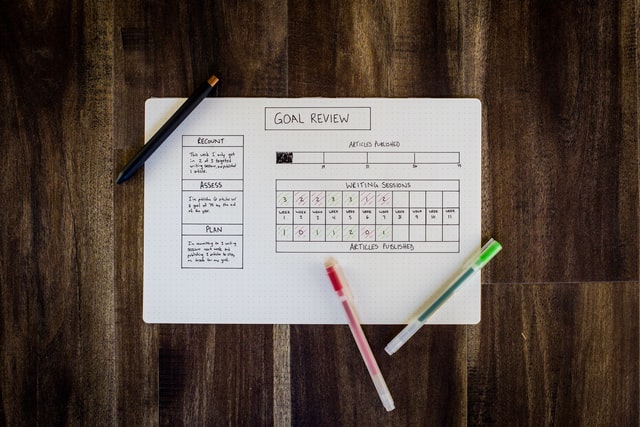Learn to learn
The benefits of learning new things are plentiful, whether for a hobby or work. While it can be hard to learn something new, the farther you come, the more motivated you will become, which will bleed into other aspects of life. Your brain will be healthier. All this will improve your outlook and make you happier.
You can learn to cook or play an instrument. You can take courses in lock picking, knot tying, and meditation. Perhaps you’d prefer to learn to code or how to draw. Maybe you want to be the decluttering master or edit photos. These are all skill sets you can learn from home. Most will have the added effect of improving your family’s lives.
Learning can be challenging. Motivation can be powerful, and people come out hot. The key to success is to set goals. Goals are healthy habits that can lead you to great things.
Identify your goals, and set them out clearly
Goals are your roadmap to success if appropriately created. When we talk about goals, they can’t be vague or impossible. Cleaning the house in a day is impossible. Sure, you could probably do it, but the minute your family wanders in and dirties another dish right after you clean the kitchen, you’re behind in your goals. Instead, you want to break that goal into manageable steps leading to a clean home. Maybe your goals today are to dust the living room, sweep the floors, and tackle some clutter on a side table. You can accomplish this. and your house becomes cleaner. Your brain also rewards you with the satisfaction of achieving your goal.
Make a list
Writing goals down creates visual stimuli for you. It helps you understand the scope of the work, which will assist you in scheduling and splitting up the work. You can organize your list in whatever way works for you. Don’t keep goals in your head. Your head is a place where thoughts come and go constantly. You need somewhere these goals won’t float away into the ether.
Prioritize
You might have an extensive list of goals, and you might have a small one. Either way, you can see them on the page. Which ones do you prioritize? I learned too late to prioritize exercise since I work at a desk. Do specific goals have time restraints or closer deadlines? Are there goals you’re not looking forward to? If your goals are in small, manageable steps, consider picking the one you least want to do first. Then, whenever you look at your list, you’ll always feel satisfied that the complex task is out of your way instead of feeling doomed.
Learn from your mistakes

Nobody likes to make mistakes, but they will happen. As you work on your goals, sometimes you will falter. Let go of the shame and guilt when this happens — forgive yourself. Once you do this, you can look at those mistakes objectively and learn from them. When you think about these mistakes, whatever they may be, you don’t want to feel bad. You felt bad when you made them, and you don’t need to feel bad now. Instead, take the lesson and be proud of yourself for finding it. When you master the ability to analyze your past to improve your future, you will improve in many aspects of your life.
Create a Success Plan
Creating a plan for success can be daunting. If you knew how to achieve success, then why haven’t you? To do this, let’s look at your goals and dissect them. As a bonus, this dissection technique can guide you if you encounter any roadblocks to your plan. Goals need to be SMART, which we’ll dive into below. If you don’t know how to do something specific, make a goal to learn. This could be as simple as “research marketing for an hour each day this week.” You may not know anything about marketing, but you soon will, by setting a research goal. The goal can include reading some marketing books or following blogs from successful marketers. After you know seven hours’ worth of marketing, you can develop further goals to continue your self-improvement and implement the knowledge you have.
Let’s dive into SMART goals.
S – Specific. “Get fit” doesn’t tell you much of anything. “Complete Jimmy’s Cardio Blast workout without pausing to catch your breath” not only forces you to practice, but it’s much more specific. “Run” isn’t the same as “run around the park once without stopping.”
M – Measurable. How will you know you’re closer to your progress? Maybe you note how far around the park you can run without stopping and keep pushing yourself to take an extra five steps farther. I match my previous day and add one more lap whenever I swim. I strive to add five, but one is enough. It’s a measurable development toward my goal.
A – Achievable. A good goal is slightly challenging, so you need to work hard, but not so difficult that you’re doomed. “Write a novel in a month” is a brutal goal only because that’s not achievable. If you broke that down into doable chunks, maybe it’s not impossible. “Write a chapter a day” is more manageable, though also tricky. Instead, set that goal to “write five hours every week.” This is flexible, which means you’re likely to achieve it. It’s also measurable. Specifically, “write five hours of new writing towards novel completion every week” is very clear.
R – Relevant. Your goals must align with your contentment and enjoyment of life — in all its forms. You have no reason to set a goal to do a thousand pushups in a week if you despise them. There are other ways to gain strength you might enjoy. Occasionally, we have to tackle goals we dislike for the bigger picture, but those goals are relevant. “Do the laundry” may be a goal you hate, but it’s a pertinent goal if you value a clean house.
T – Time-Bound. Determine when you’ll achieve the goal. If your goal is quite large, break it down into smaller increments. Today you’re going to look up three salmon recipes. Tomorrow you’re going to buy the ingredients. The day after, you’re going to prepare a garlic dill sauce. The day after that, cook it! Those minor time-bound breakdowns make a fantastic map to achieving a goal.
Make your home the perfect environment for your success
Your Surroundings Play a Big Part
Dedicate your environment to what you want to use it. If you can utilize your home to work in your workspace, play in your playspace, and work out in your fitness space, you will naturally have a mindset to do those tasks. The opposite is also true. If you constantly snack at your desk, you may unconsciously want to snack whenever you sit there. I do this on the couch every time I sit down. Your dedicated spaces should be functional. A craft room with no craft supplies isn’t all that helpful. A kitchen with no utensils isn’t ideal. Atmosphere plays a significant role in this as well. If the colors of the walls are distracting, or you have improper lighting for what you’re trying to accomplish, you’re doing yourself a disservice.
Keep Things Separated
If you’re limited on space, which is becoming a common issue, it’s okay to have areas that require you to double up. The trick is that one space needs to be able to be put away and brought out with relative ease. The dining room might be the yoga studio. Your areas need to be separate, so your mindset aligns with what that area serves when you enter (or create) that area. You can DIY these spaces or look up a pro that might be able to help you in this process.
Here we give you a list of how you can use a space for different activities and goal setting:
- Office/Gym: During your working hours, your office or workspace should be for that only. For this, you would need a space with light, without distractions, a comfortable chair, and a desk that allows you to focus 100% on your work activities. You can decorate your workspace as you see fit, but make sure it motivates you! After working all day what you want most is to relax and there is no better way to do it than exercising. Whether you prefer to do it before work or later, make sure you have a space dedicated solely to your exercise to meet your goals. A corner or closet in your workspace can quickly become a gym. Make sure you ask for help, whether reaching out to an expert or DIY a rack where you can put your mat, ropes, dumbbells, or any other accessory you use to exercise. This will help you to be able to divide your space for both work and exercise, and you will dedicate the attention that each activity requires at the right time.
- Library/Relax Room: Who doesn’t like to read a romantic or suspense novel on an afternoon where you have time to relax? No matter your preference in the literary genre, reading a book is always an excellent decision, and you can also create goals for it. If you have a library in your house and your books are perfectly organized, why not use this space also to be able to relax and meditate on your day? Use this space for both. In the corner of that room, you can have a comfortable chair to curl up in while you cry over that romance novel .In the other corner, you can create a small oasis to go into deep relaxation that allows you to meditate and attract positive things into your life . Make sure to add some essential oils, a mat, a nice outdoor view, and a cozy rug would also be a significant element to add.
- Garage/Craft room: We usually use the garage to store our camping gear or other tools, even the Christmas tree and the car. But why not give this space a fun twist? You can use this space to learn a new skill like painting, to sing, playing an instrument, or even building something from scratch. The most important thing to be able to use this space is that you have everything very well organized and classified in bins with labels. One afternoon after work, you may want to practice that instrument that you like so much and as a goal to learn a song and sing it in front of your family and friends. Make sure you have a space that allows you to organize yourself and focus on one of the activities you like the most. If you want to learn to play an instrument, you will need a chair, a table or desk to put the laptop or phone where you can find the notes to follow, a notebook, or any other accessory you think is necessary.
Keep track of every kind of progress – everything counts!

Accomplishments fuel your brain. If you have a challenging goal, set achievable milestones, and track them. Are you losing weight? Measure your inches beforehand, so you can measure later and see progress. Writing a book is simple to follow because your word count and page count will gradually increase. Cleaning a house is less straightforward. For a job like this, create a master list with all the small tasks you need to finish on it. Every time you check one-off, your confidence will increase, and you feel great. You’ll often utilize this habit once you see how awesome it is.
Be patient — you got this!
Some goals take time. I don’t know how long it takes to climb a mountain, but I know I can take steps. I need to repeat that until I’m at the top. To practice patience, don’t look at the big picture. Focus on the next immediate thing.
Take it easy — no rush
If you’re going to do it, do it right. Deadlines aren’t created to stress you — they’re built to inspire you. If your goal gets thrown off course, adjust until you feel it’s reasonable, and carry forward. This is a great reason not to tie your goals to your self-esteem. Things go wrong, but that’s not a reflection of yourself. You want to do it right, not necessarily right now. If you are struggling, take a day or two for self-care.
Find a partner in crime, someone to motivate you
Having a partner in some form to encourage you is exceptionally valuable. A friend or family member, or even a stranger on the internet who cheers you on, can make a big difference. Your goals don’t even have to align. It’s all about the mindset. I had a friend doing her dissertation, which was a real struggle for her. So daily, we’d chat about our immediate goals and congratulate each other for accomplishing them. She told me it saved her bacon. Also, if your goal is particularly isolating, this is a great way to bring a social aspect to it.
Celebrate your victories once you succeed
I’m very serious — you need to celebrate your success. You don’t have to spend money or create a massive affair, but you must take your time and savor your wins. Go for an extra walk around the park or purchase a nice treat. Make a toast with your loved ones or lie back and close your eyes for an hour. Celebrate in a way that’s right for you, but do it often. You’re achieving your goals — you deserve to celebrate.




